Photo: © GetRealAfrica.com
The Kalahari Bushmen are an indigenous people who have survived with their way of life for tens of thousands of years. Renowned for their intimate knowledge of the natural world and their profound connection with the land, they have maintained a delicate balance with the environment guided by ancient wisdom, that has ensured the continuity of their culture.
The Kalahari Bushmen are primitive, hunter-gatherers that live in an egalitarian society with no hierarchical structures, no religion, no possessions and are nomadic.
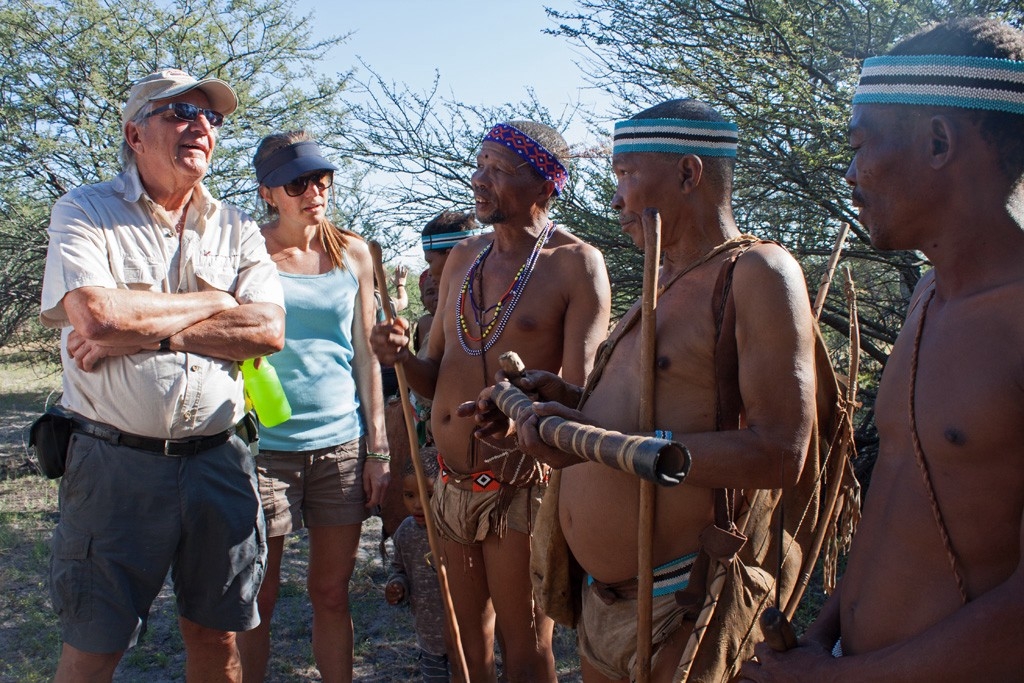
Guests interacting with the Xgau clan. © GetRealAfrica.com
Clive Horlock was born and bred in the wilds of Southern Africa and has worked closely with indigenous people, more specifically the Kalahari Bushmen for the past few years. Beguiled by his experiences and the lessons learned in walking with the Bushmen, he believes there is a lot the modern world can learn from these remarkable people. He now offers this opportunity through his company Get Real Africa in Botswana.
“The driving force behind my entire initiative is that both animals and wild places are disappearing at an alarming rate and urgent action is required,” says Clive.
Having spent extended periods of time camping and walking in the bush; Clive wanted to offer others a ‘purists’ experience, away from all the trappings of the modern world. In seeking the best possible guides for his company, he knew the Bushmen, whose tracking abilities and knowledge of the bush are unsurpassed, would be the ultimate guides.
However, searching for the ‘right’ bushmen was no easy task as many have been removed from their ancestral land and suffered enormous cultural genocide or become disconnected from their cultural roots.
“There are a few mavericks who still roam the wilderness, but they are not reliable enough to interact with guests,” says Clive, “while others have become too commercial in their outlook.”
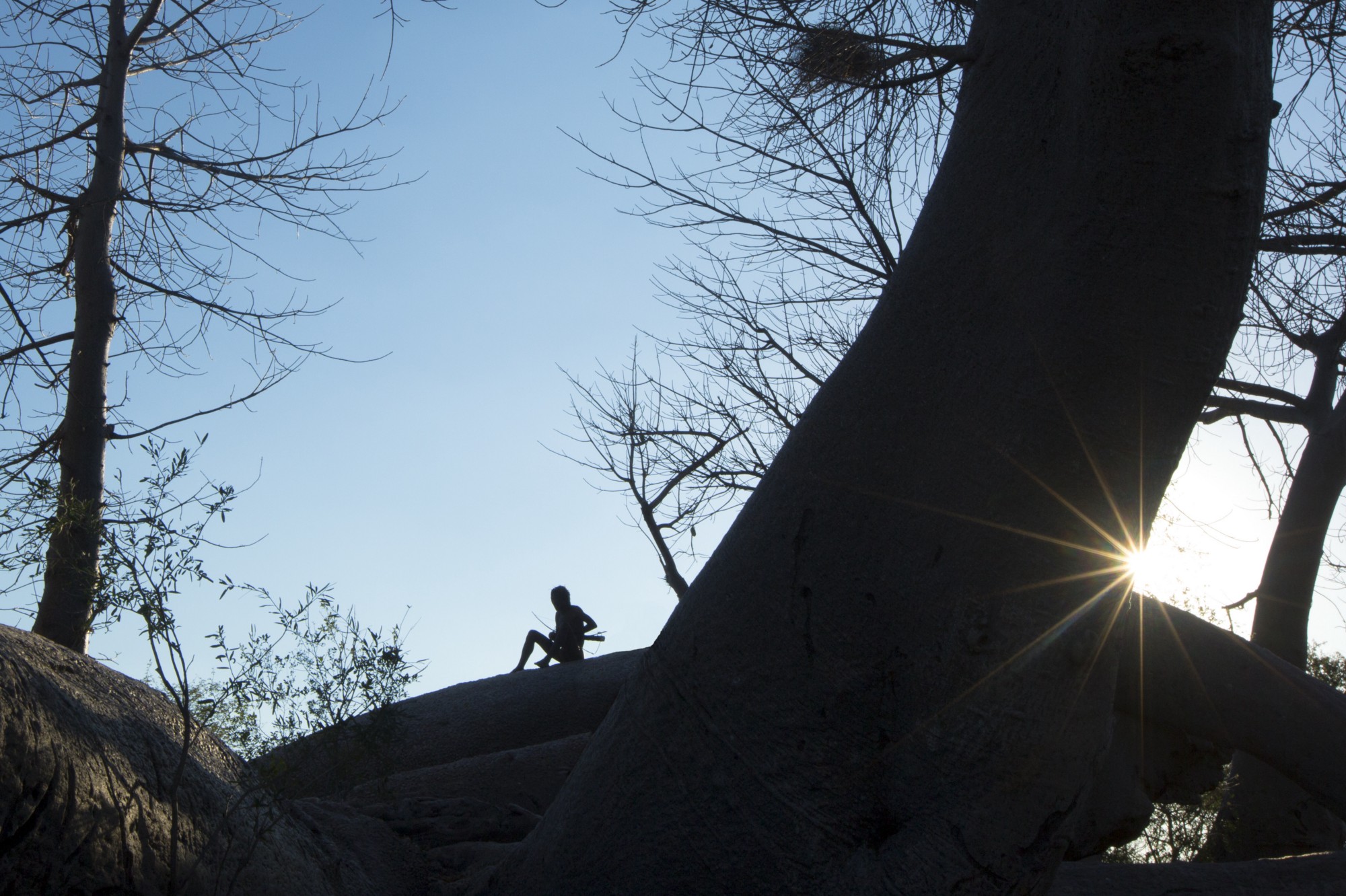
Photo: © Adobestock.com
In 2016, Clive came across the Xgau clan, in the Okavango Delta region of Botswana, who still maintain their traditional values and who are enormously knowledgeable and willing to interact with guests.
“It was not long into my first walk that I started to realise that there was more going on than I could have ever anticipated. I witnessed behaviour that I did not at first understand and other behaviour which has been described by experts as ground-breaking.”
One such story which Clive shares regularly is called the Seven Seeds.
“Watching Bushmen unearth a tuber, which is used to quench thirsts in the semi-desert environment in which they live was special enough, but what transpired at the same time was for me even more profound,”says Clive.
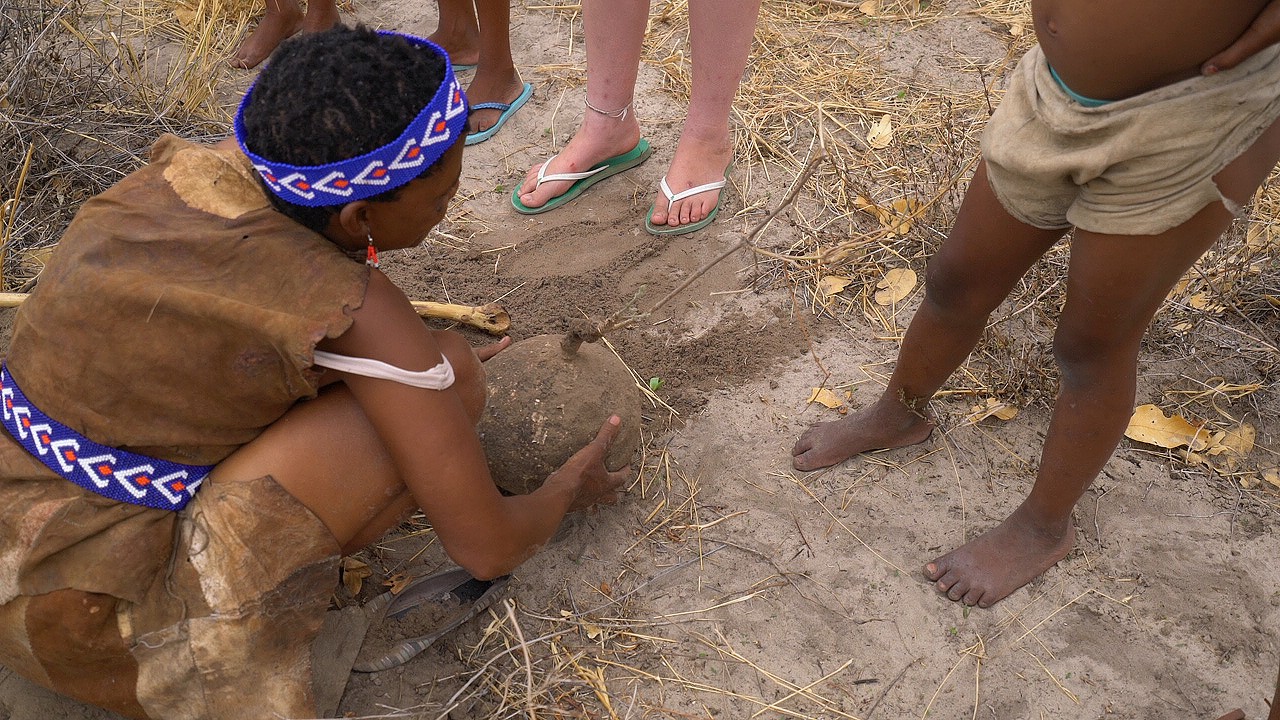
Bushmen unearth a tuber. Its pulp holds moisture used for drinking and a healthy stomach. Photo: © GetRealAfrica.Com
“From the sickle bush above the tuber, Xigae 1 removed a seed pod containing six dandelion like seeds.
Without any prompting Xigae 3 ( seven years old) came and took the seeds and then proceeded to plant them in suitable locations in the vicinity. I watched the process without speaking, but finally, when all signs of digging had been neatly cleaned up, I asked one of the elders ‘Why did the little boy do this.’ His answer was, ‘to share with those that follow!’”
“My understanding that original hunter-gatherers only took from the environment and just lived for the present was being tested. The seventh seed was the seed of doubt I had in my mind.”
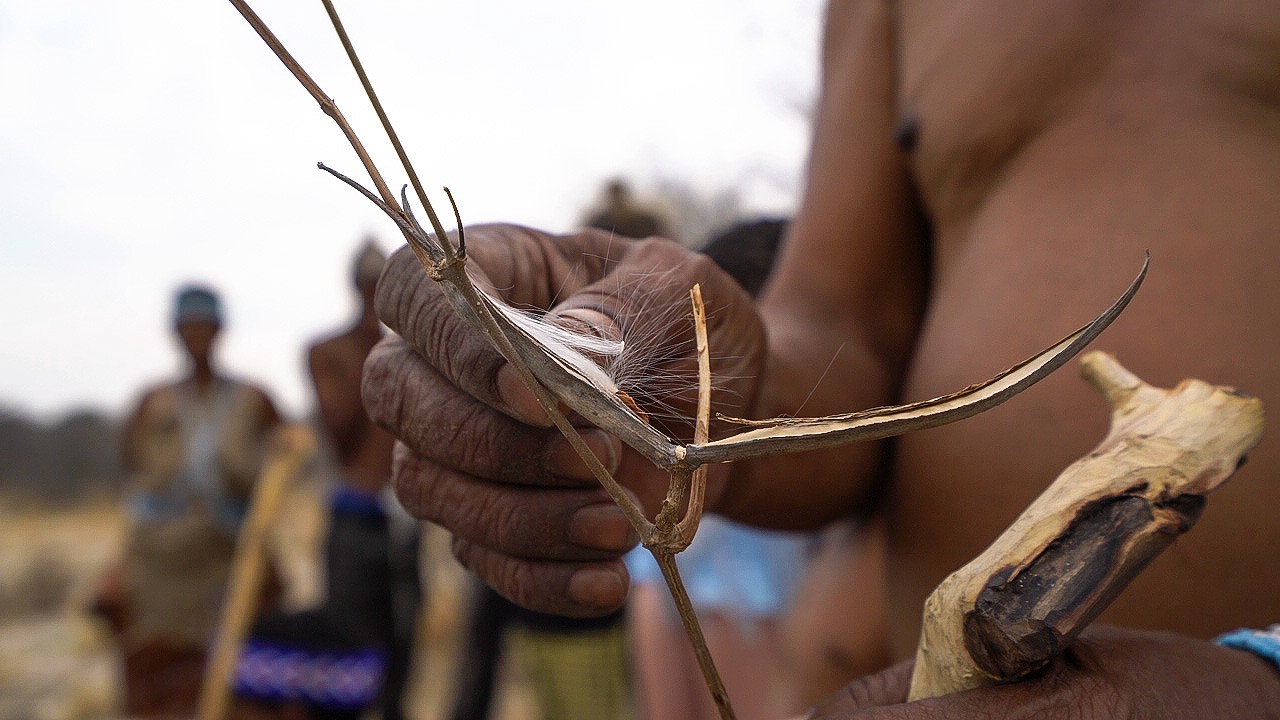
Seed pod containing dandelion seeds. © GetRealAfrica.com
“A later incident, where I saw the gatherers remove only three roots from a clump of approximately eight much sought after roots, before refilling the hole, further questioned my beliefs. (It also needs to be noted that this group of Bushmen were foraging in an area hundreds of kilometres away from their home and had no intention of ever returning to the area.)
Their actions not only confirmed a culture built on sharing, but contrary to popular belief, provided evidence of forwarding planning and sustainable living.”
In interacting with the Bushmen over time, Clive discovered there was so much more to learn from these remarkable people.
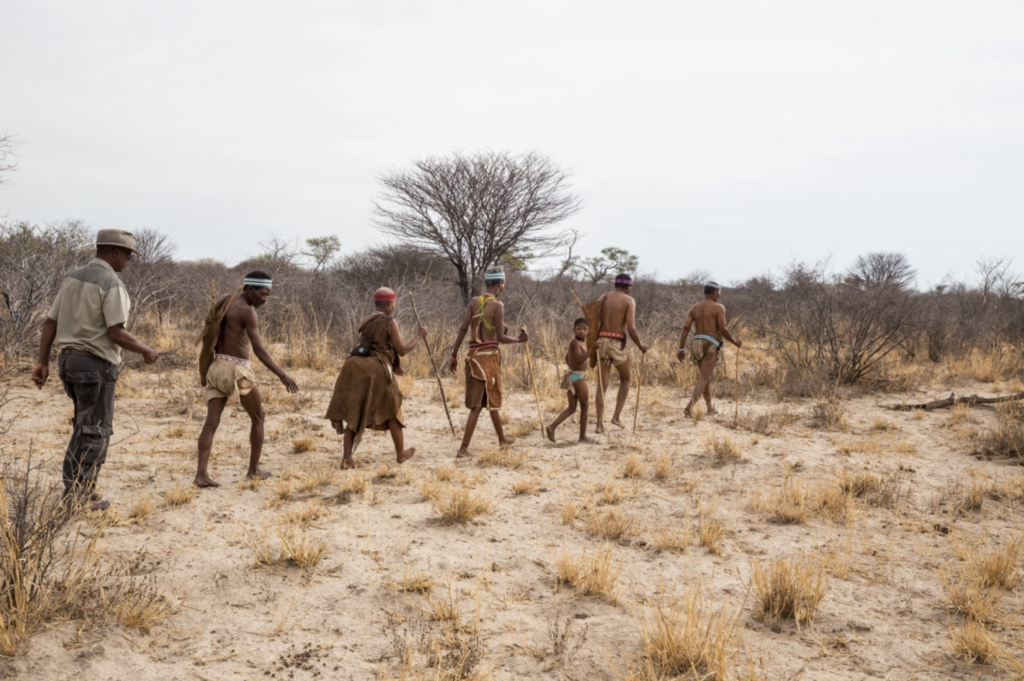
Walking with the bushman. © GetRealAfrica.com
“Their tracking ability goes beyond understanding; they can employ all their senses and knowledge to read the signs that go beyond the visual. (18 animal typologies have been recorded which the Bushmen use when they hunt to predict the behaviour of their prey).
Of the many lessons learned, Clive began to understand what it meant to be truly egalitarian; the benefits derived and the importance of teamwork and implementation of democracy in the Bushmen’s survival.
“I believe that the Bushmen have a significant contribution to make. This includes ways to ensure social cohesion, being human and suppressing ego so that love triumphs.”
What sets the Bushman apart from modern man is not only their connection to the natural world but to humanity and inner self.
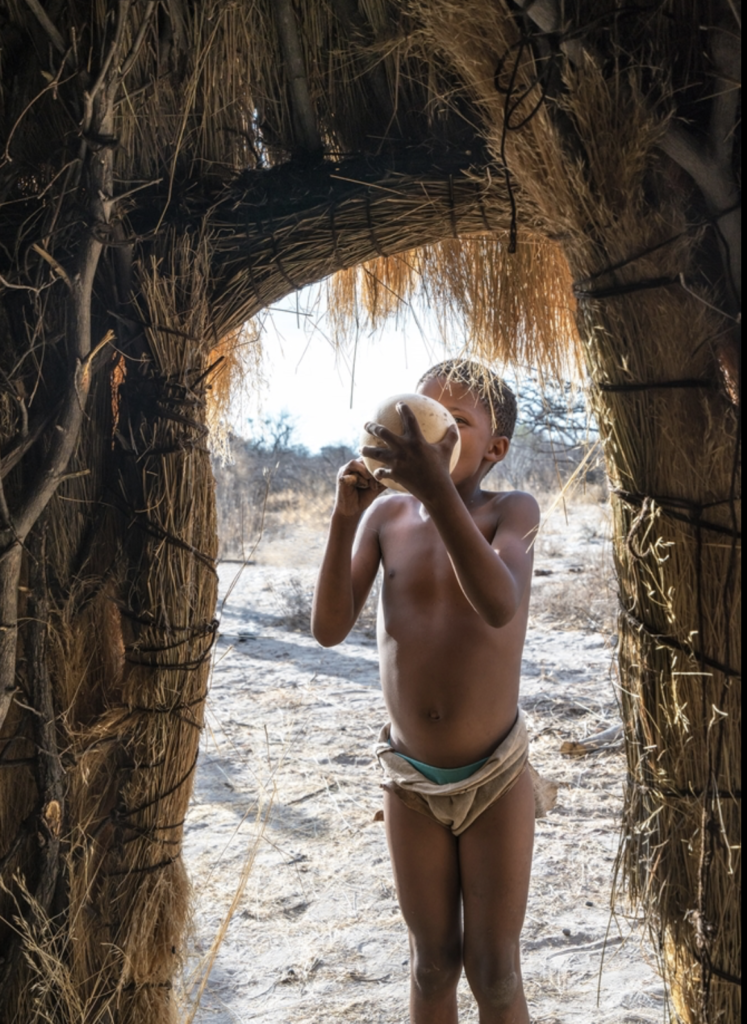
Drinking from an ostrich egg. © GetRealAfrica.com
For the majority who will never be privileged enough to interact with these people, or experience what humans were supposed to be, Clive is adamant the message needs to be conveyed in every way possible.
“What’s most amazing are the secrets embedded in their culture which have enabled them to protect the environmental integrity of our planet for more than 40,000 years. Despite the present genocide of their culture, they still manage to achieve a level of contentment and happiness which would be the envy of most people living a life of abundance.”
In the light of our current planetary crises, it got me asking the question “what were the reasons for this remarkable achievement and what can the modern man learn from this?”
Interested in walking with the Bushmen in South Africa? Get Real Africa provides guests with the opportunity to interact with the Xgau Bushmen in order to start appreciating the value of their culture and the message it provides. Visit Get Real Africa to book your trip!
